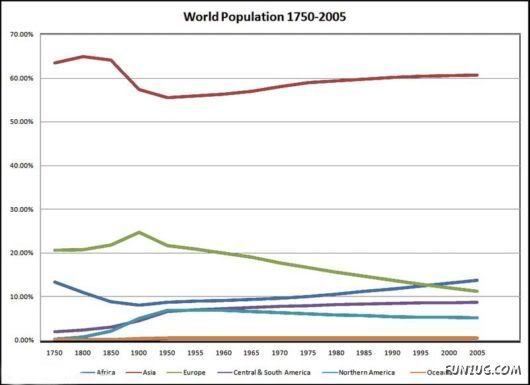Number of humans who have ever lived
In the 1970s it was popular to believe that 75% of all the people who had ever lived were alive in the 1970s, which would have put the total number of people who ever lived as of the 1970s as less than the current number of people alive today. This view was eventually debunked as a myth. A more recent estimate of the total number of people who have ever lived was prepared by Carl Haub of the Population Reference Bureau in 1995 and subsequently updated in 2002; the updated figure was approximately 106 billion. Haub characterized this figure as an estimate which required "selecting population sizes for different points from antiquity to the present and applying assumed birth rates to each period".Given an estimated global population of 6.2 billion in 2002, it could be inferred that about 6% of all people who had ever existed were alive in 2002.
Other estimates of the total number of people who have ever lived range approximately from 45 billion to 125 billion, with the more robust of these falling in the 90–110 billion range. It is difficult to estimate for the following reasons:
* The set of specific characteristics which define a human being and distinguish early Homo sapiens from earlier or related species continues to be a subject of intense research and debate. It is thus not possible to know when to begin the count, nor which hominids to include. See in this regard also Sorites paradox.
* Even if the scientific community reached wide consensus regarding which characteristics distinguished human beings, it would be nearly impossible to pinpoint the time of their first appearance to even the nearest millennium because the fossil record is simply too sparse. Only a few thousand fossils of early humans have been found, most no bigger than a tooth or a knucklebone. These bone fragments are used to extrapolate the population distribution of millions of early human beings spread across the continents.
* Robust statistical data only exist for the last two or three centuries. Until the late 18th century, few nations, kingdoms, or empires had ever performed an accurate census. In many early attempts, the focus was on counting merely a subset of the people for purposes of taxation or military service[citation needed]. All claims of population sizes preceding the 18th century are estimates, and thus the margin of error for the total number of humans who have ever lived should be in the billions, or even tens of billions of people.

Population by continent as a percentage of world population (1750–2005)
 INFORMATION CLUB
INFORMATION CLUB Informative Zone
Informative Zone Top Ten Countries With the Highest Population
Top Ten Countries With the Highest Population INFORMATION CLUB
INFORMATION CLUB Informative Zone
Informative Zone Top Ten Countries With the Highest Population
Top Ten Countries With the Highest Population
